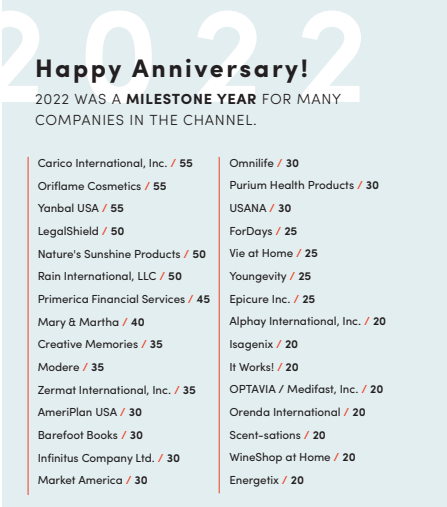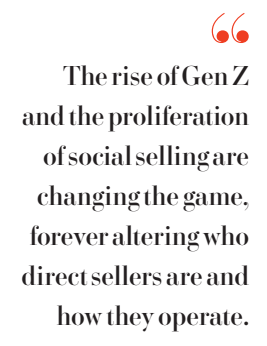What shaped 2022 and what to expect in 2023 and beyond.
To say direct selling is in a time of transition would be an understatement.
The environment is evolving as younger generations explore the opportunity. And the post-pandemic trends of quiet quitting and the desire for more workplace flexibility continue to shape where, how and why people of all ages choose to earn a living.

Everyone working in the industry is aware of the decisions, pivots and pain points we have ahead of us as executives, as companies and as a channel. With this rapidly changing landscape in mind, Direct Selling News recently gathered over 75 C-Level executives representing a combined $43 billion in revenue to get their perspectives on the challenges and opportunities facing the channel.
The topics most often mentioned should come as no surprise. Concerns like changing consumer behaviors and a tough regulatory environment as well as lingering supply chain struggles, Amazon and eCommerce strategies and field fatigue were mentioned often. Mergers, acquisitions and consolidations also continue to be a popular topic of conversation.
But other more esoteric topics have come up recently as well. Topics that get to the heart of who we are as a channel and how we will do business in the future. The channel’s new identity as a social selling platform; the rise of single-tier affiliate models; and the slight decline of multitier compensation plans are just a few examples of what some executives have referred to as the “identity crisis” the channel is currently experiencing.
Mergers, Acquisitions and Consolidations
The end of 2021 and the entirety of 2022 saw many mergers, acquisitions and consolidations take place in the channel. There were several factors driving this. Some companies looking for strategic partnerships to build their brand reach in an organic way aligned with companies with complementary product lines and customer bases. Other growth-oriented companies focused on expanding their international footprint in a post-pandemic world. Whatever the strategy behind these moves, they each represented a notable shift in the way companies were preparing for the future.
Betterware de Mexico completed their acquisition of JAFRA North America in April of 2022. The deal expanded Betterware’s categories to include beauty, personal care and fragrances while bringing JAFRA’s 443,000 consultants—who sell around $280 million annually—into Betterware, helping the company gain a foothold in the US market.
Most recently, Amare Global announced its acquisition of Kyäni, stating that this new, strategic partnership will allow the company to “further expand global reach after tripling partner growth and doubling revenue and customer growth this year, despite global economic challenges.”
“This has been a year of transformative growth and momentum at Amare, and we could not ask for a better partner than Kyäni to help propel our global vision to share the benefits of mental wellness,” shared Jared Turner, Amare Chief Executive Officer. “We are prepared to take this next step as a company to accelerate global expansion and build a foundation of empowerment, wellbeing and opportunity for as many people as possible.”

Scrutiny and Regulation
The direct selling industry continues to draw the watchful eye of the Federal Trade Commission (FTC). The agency’s interest in the industry is primarily focused on compensation plans it classifies as resembling pyramid schemes. While the channel has been diligent about defending itself against the allegations and impacted companies have shown remarkable resolve and flexibility in finding actionable remedies to the concerns, the power of the FTC has made it difficult to find resolution.
In late 2021, the FTC notified more than 1,100 multi-level marketing, direct selling and gig economy companies that it intended to pursue civil penalties of up to $43,792 per violation for misrepresentations related to potential earnings. The notice specifically referenced several practices it deemed deceptive such as mischaracterizing the level of experience required, training provided and the amount of risk involved, along with other factors.
While the intensity and scope of FTC scrutiny is daunting, there are signs that there might be a limit to what the judiciary will allow the agency to do moving forward.
At a preliminary injunction hearing June 30th in the U.S. District Court for the Eastern District of Michigan, U.S. District Judge Bernard A. Friedman required the FTC to provide more evidence in its case against Financial Education Services (FES). FES is a direct selling company that offers credit restoration services, wills and living trusts among other services. The FTC had levied pyramid scheme charges against FES a month prior.
There are also positive signs in the agency’s years-long litigation with Neora, a direct selling health and wellness company. Neora filed suit against the FTC in 2019 before the agency filed suit against them. The FTC alleged that Neora’s compensation plan was a pyramid scheme—a charge the company fervently denies and has gone to great lengths and expense to disprove.
This is a bold move by Neora—and one that represents the industry well—as they were willing to prove their data and facts in a court of law. This will be a very impactful case for the future of the direct sales model.
The Challenge of Field Fatigue

What goes up inevitably must come down—and that is clearly illustrated by the struggles facing the field. The record growth of 2020 was fueled in large part by an influx of new distributors joining the industry or new companies without proper onboarding or introduction into the companies’ cultures and systems. Now that the pandemic spike has ended and growth is flat or down, distributors that joined during that time are struggling, and established and experienced field leaders are feeling the pinch as well.
One executive characterized the current state of affairs as distributor demoralization rather than distributor fatigue. New distributors tended to make money faster and with less effort in 2020, and they are now looking for something or someone to blame for the change: the products, the company or even the model itself. “For the past couple of years, they’ve been sharing about how successful they are to their friends and families on social media, and now they have lost all enthusiasm and energy,” the executive shared.
Amber Olson-Rourke, Chief Marketing and Sales Officer at Neora sympathized with the emotions distributors go through as they experience the highs and lows of building a direct selling business. That roller coaster is also something that corporate personnel experience, too. “Honesty and transparency are the core of our field communication strategy,” she explained. “Acknowledging the hard times is an important part of empowering the field to move forward. If we pretend that everything is always great we lose trust and credibility with them. Every business has moments of hard, it is how you work through those moments that determine your ultimate success.”
We anticipate that the needs and concerns of distributors will be an important focus in 2023 and beyond. Creating community built around personal connections and culture has always been an important part of direct selling and that spirit will continue to grow by emphasizing product success stories organically over social media platforms. Companies will also continue to refine and modernize how they pay their distributors—rewarding sales over recruitment, paying in a more timely fashion and getting creative in the types of incentives and perks offered.
The New Face of Direct Selling
Many of the new distributors coming into direct selling in the past two years come from a new and emerging demographic. The rise of Gen Z and the proliferation of social selling are changing the game, forever altering who direct sellers are and how they operate. There are several shifts the industry is making in order to better serve, attract and retain these newcomers to direct selling.

Many new companies avoid the “MLM” stigma altogether, focusing instead on building single-level direct sales programs and paying their sales force strictly on selling—not recruiting. Established companies have also made this pivot or experimented with supplemental affiliate programs that provide an alternative for entrepreneurs not interested in the more traditional direct selling team building approach.
One of the results of AdvoCare’s settlement with the FTC in 2019 was the revision of their business model to single-level distribution paying compensation based solely on sales to direct customers and supplemental bonuses.
AdvoCare’s CEO Patrick Wright explained that some people want to just sell the product and not build a team. “It’s advantageous for you to ask yourself what changes you can make in your structure to help make that happen for them,” he shared. “You must ask for and earn the field’s trust and tell them that in doing what is best for the customer, you are also doing what is best for the company and ultimately for the field as well.”
A great example of a young company blazing new trails in the direct selling space is FASTer Way to Fat Loss, a virtual fitness and nutrition company teaching clients how to burn fat and live healthier through intermittent fasting, carb cycling, macro tracking, whole food nutrition, strategic workouts and a positive mindset. The company pays 50 percent commission to their certified coaches and a one-level referral fee of 10 percent on coaches that they recruit. FASTer Way has served nearly 200,000 clients since its creation in 2016.
Built for the Future. Built to Last.
Without a doubt, 2022 was a year of change for direct selling. And 2023 looks to be a year of more evolution. But rather than being a cause for alarm or discouragement, these changes can be seen as signs of progress and harbingers of growth as the channel creates a viable, modern and sustainable model that provides a real opportunity for aspiring entrepreneurs. And, it’s important to note that in a slow, sluggish economy, direct selling is needed more than ever.
Fairly or not, direct selling has been the subject of scrutiny and scorn. Some of that negative attention has been earned in the past through outlandish claims, aggressive recruitment programs, front loading and other outdated practices. Practices that are, thankfully, falling out of favor.
But as the scope and scale of the industry grows, what it offers has grown as well. Best-in-class products. Personalized customer service. A sense of community and being a part of something bigger than yourself. All of these are examples of what modern direct selling actually is—not what it aspires to be.
DSN believes that the channel has an immediate and permanent opportunity to evolve and expand the channel by sharing a message of powerful, exclusive products and a part-time, flexible opportunity. The good news is that message is totally within the channel’s control. As we look back on 2022 and look ahead to 2023, we can confidently build relevance, value and credibility—and a clear path for future success.

A quick look at the key milestones & top stories of the past year.
JANUARY
- WFDSA Chairman: Industry Sales Reached $179B in 2021
- DSA Announces Support of the FTC’s Efforts to Stop False COVID-19 Product Claims
FEBRUARY
MARCH
- FTC Proposes New Rule to Regulate Deceptive Earnings Claims
- Natura &Co Delays NYSE Listing
- Direct Selling Companies Respond to Crisis in Ukraine
APRIL
- Betterware de Mexico Completes Acquisition of JAFRA in US and Mexico
- DSN Releases 2021 Global 100 List with 58 Companies Exceeding $100M in Annual Sales; Amway Tops List for the 10th Consecutive Year
MAY
- FTC Lawsuit Against AdvoCare Results in $149M Payout to Former Distributors
- Dot Dot Smile Dissolves Direct Sales Model
- FTC Shuts Down Financial Education Services
- DSA Files Comments with FTC Regarding Proposed Rulemaking
JUNE
- DSA Reports Industry Retail Sales in US Reached $42.7B in 2021
- Tupperware Sells Its Nutrimetics Beauty Business
- Judge Reverses Decision in Financial Education Services Case
JULY
- Amway Begins Closing Operations in Russia
- New Image Acquires Nutrimetics
- Young Living Suspends All Business Operations in Russia
- It Works! Founder Launches Streaming Platform
AUGUST
- InCruises Announces Name Change to InGroup
- Scout & Cellar Launches Scout Wild in Target Stores Nationwide
- MONAT Opens New Global Headquarters in Florida
- New Age Files Chapter 11 with Reorganization Planned
SEPTEMBER
- JR Ridinger, Founder of Market America Passes Away
- Red Aspen Breaks Ground on New Headquarters
- Gwen Stefani Launches Social Selling Platform with the GXVE Community
- DSA Hosts Direct Selling Day on Capitol Hill
- Amare Global Acquires Kyäni
OCTOBER
- Tupperware Launches in Target
- New Age sold to John Wadsworth, Jr., a Morinda Brand Partner of 25 Years
- Neora and FTC Go to Trial
- Medical Marijuana Acquires MFINITY
NOVEMBER
From the December 2022 issue of Direct Selling News magazine.


